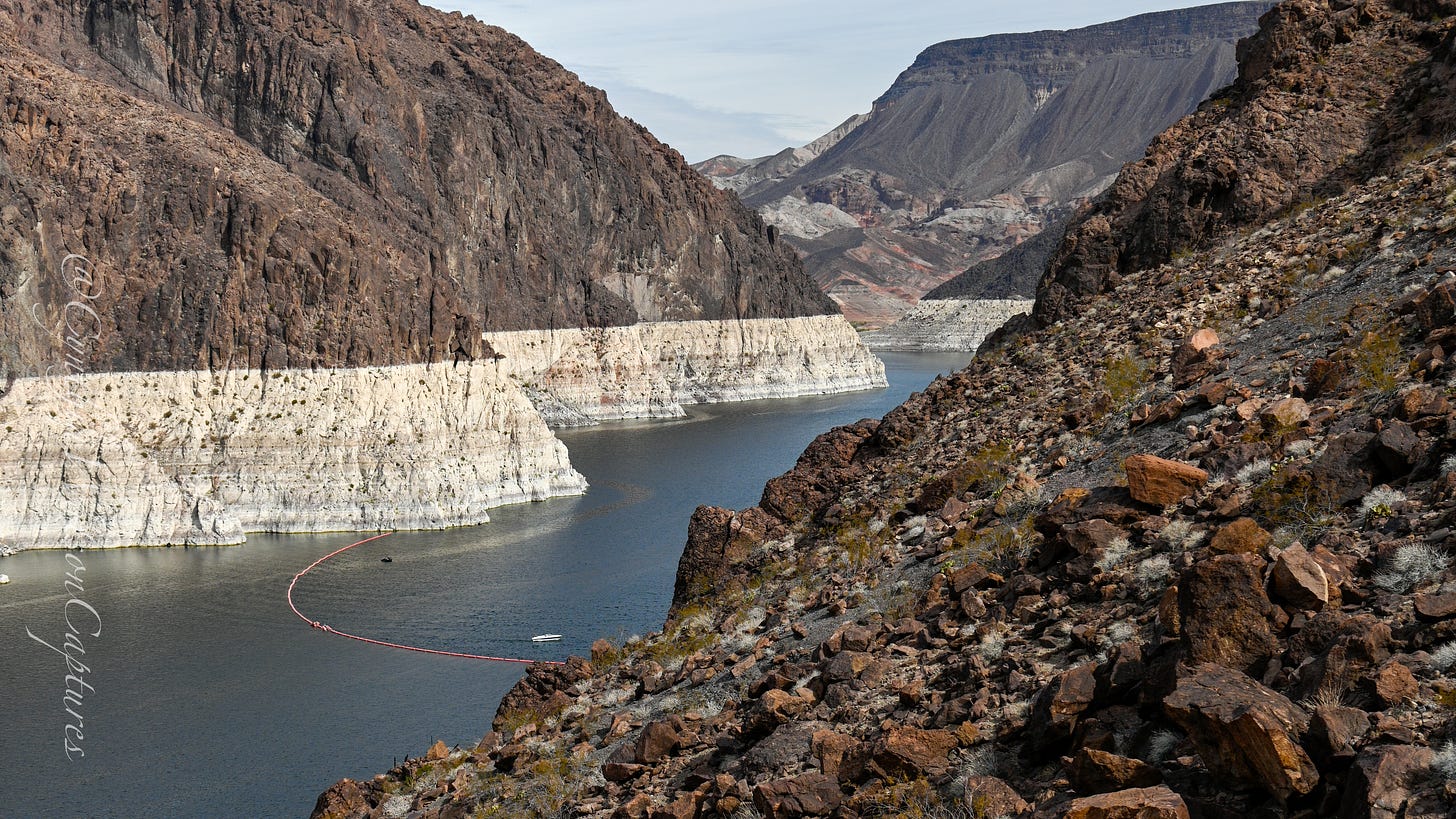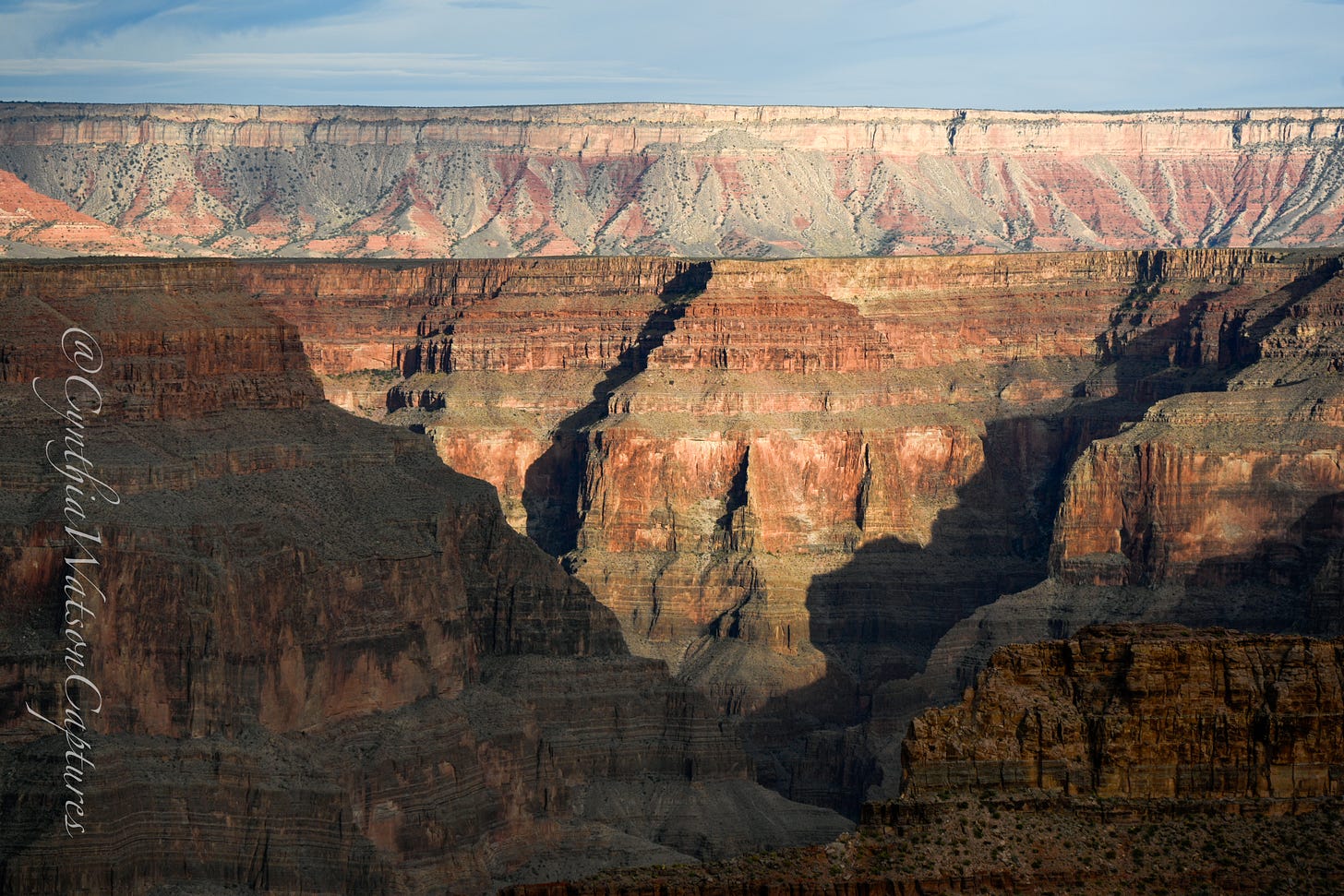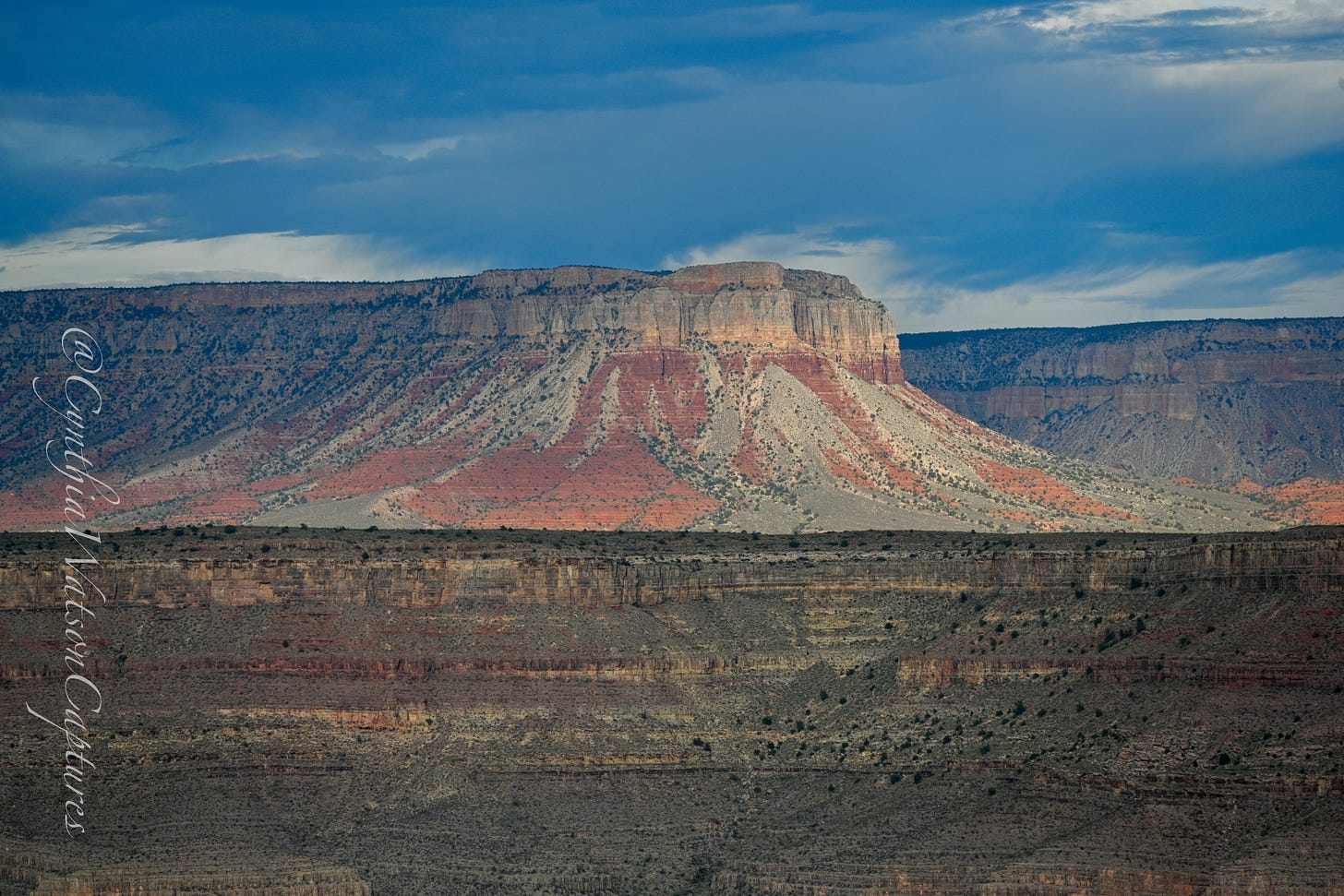We spent the day amidst billions of years yesterday, juxtaposed against contemporary events I might never have expected.
The engineering marvels, the emptiness, the majesty, and the not-so-subtle reminders that nothing stands still for any of us were our few hours in Arizona and Nevada yesterday. The Hoover Dam, a product of government both addressing flooding and providing brave but desperate men jobs to support their families, met its deadlines early. The land is so much more rugged than I expected it the ingenuity is breathtaking so being able to succeed early was a tribute to shared national goals.
So too is our abuse of that vital item, water. The white thick line you see is where water levels were in 1983 yet the population of Vegas has by three fold since then. I saw not a single curb water usage suggestion nor any sort of recycling bin while here four days. It is ours and we will use it, I suppose as our attitude, though I offer at our peril.
But it was the Canyon itself, a tribute not only to erosion but to the volcanoes that produced the variety’s layers, that awed. I had been twice before but never to the West Rim. I happen to be reading a book on volcanology, a primer that the ground and the interior of this globe is far, far more constantly shaking and moving in ways much more powerful than the actions of us on the surface. There is no permanence, only constant, unremitting change whether light or land.
Some of us want to cling to what we see as the safety of the past we thought we experienced while others push for a future we assume we can implant. In the end, however, each and every one of us is here for barely the blink of an eye. We will have little true power over this earth.
Those who occupied this land before my family arrived see a princess kissing her horse in this photo, a reminder of an Indigenous culture with different set of values from our contemporary one. That does not mean better or worse but different.
But that is the point: we share this planet and especially this country for a few short years that are the span of each individual’s life. We can damage the land out of selfishness or we can conserve or we can “just be” but ultimately the earth will win. That inner core so much powerful than any of us because it always evolves and is so powerful.
Like the clouds in a lazy Sunday in late October, things we cling to will change. Is it worth tearing ourselves apart in a futile attempt to defeat reality?
Thank you for reading Actions today. I welcome each and every thought. I appreciate your time reading this, especially the subscribers who support it financially. Please chime in. Please circulate if you find it of value
Be well, vote, and be safe? FIN










I vividly remember while in Brussels taking our recycles to a patch about a mile from the house (no containers at the curb then!) and how I put a colored glass bottle in the wrong container! A lady who was there about bit my head off in an apoplectic manner (I don't understand Dutch or French) but the meaning was clear! And we did have a large container for kitchen waste which came with complete directions on how to properly wash and dry it!
~Recycling gone awry~
Your posting today caused me to grin a bit and reminded me of our two years living in Germany and working to understand their passion for environment & climate and their recycling as a supporter of those passions. The tongue-in-cheek example of understanding German thinking equates to “say things louder and more forceful in German to get the point across.” Their focus on recycling is no different.
In our village, we had a neighborhood recycling collection point with a variety of colored bins. Each colored bin related to the type of materials destined for that bin. They even separate glass by the color (green, brown, yellow, clear) with different bins for each. The example most used for newcomers to Germany is an ordinary tea bag. That tea bag, when recycled properly, gets divided into about four different bins: one for the paper tab, one for the metal staple, one for the string and used mesh paper bag and one for the residual tea grounds. It would be considered out-of-bounds to just toss the whole tea bag assembly into the wrong bin…and heaven help you if you just put the whole thing in the ordinary trash.
When we arrived, our landlord explained trash pick-up days and process. Keep in mind that the recycle bins we were provided were huge…the size of a normal American trash can. The actual “all other” waste trash cans were the same height as a normal can, but had a plug in the bottom that made only the top ¼ of the can usable for actual trash. And we were told the actual trash can should only be put out about once every 3 months. When we inquired about that strange configuration and timing, he told us the intent was for us to recycle more than we threw out in the trash – recycling was picked up each week. And, he said, the cost of trash pick-up service was “extremely expensive” – thus only use it every two or three months (said loudly and forcefully in German)! So…for the first year we were pretty religious about separating all waste and recycling as instructed. It was tedious and time consuming. Despite my German heritage, I’m an American which makes me inherently lazy in the eyes of the world. I didn’t care for the recycling requirements.
After that first year, I casually asked the landlord about his comment regarding the timing and expense of the actual trash can. He finally elaborated that the company would pick up the trash can each week if we put it out…but the expense! I asked what the extra cost would be. He said it was about 15 Euros each week we put it out (about $16). I about lost it. While we still did our part to recycle at curb level, we did start putting out the trash can and paying the extra “extreme” cost all the while getting disapproving looks from our neighbors.
I later learned that all the recycle bins ultimately get dumped into one large “general waste and trash” bin which is carted off to a large sorting facility where a machine separates all the stuff automatically. So all our efforts at curbside where just a legacy process that had taken root in German village culture and never challenged. From a few articles I’ve read in the past about the whole recycling issue, it sounds like in some cases, it’s costing more in manpower and resources to run the process than the benefit gained from not doing it. Clearly this is a debatable issue for many who are focused on going Green for every aspect of our lives and for the future of our planet. I’m just not sure how well it’s actually working.